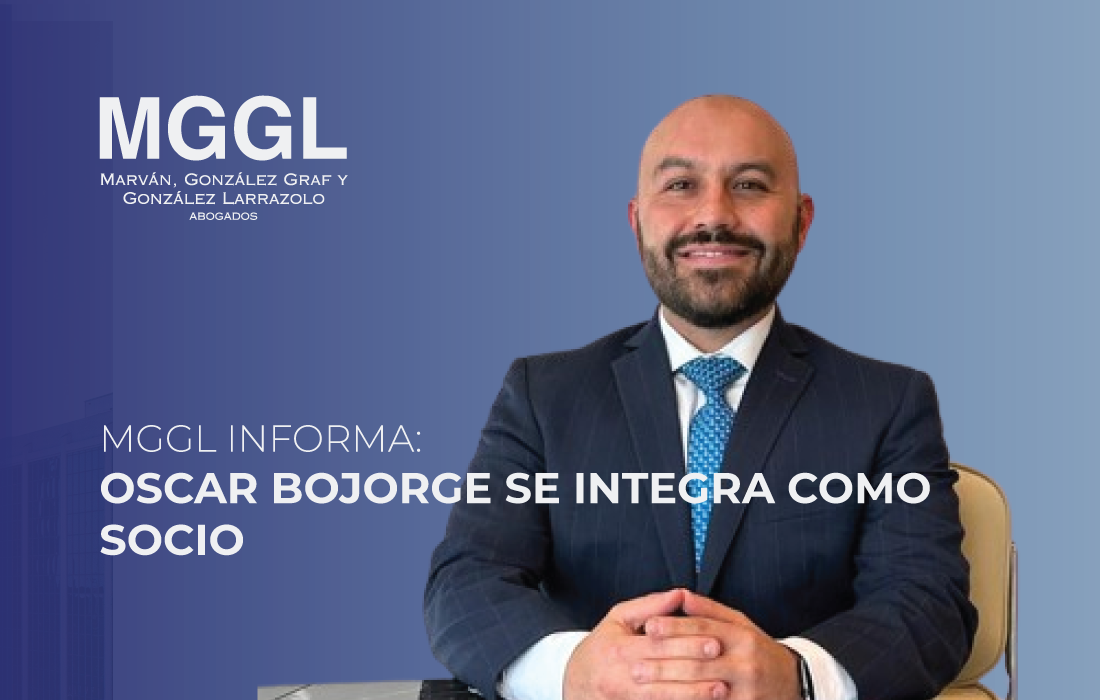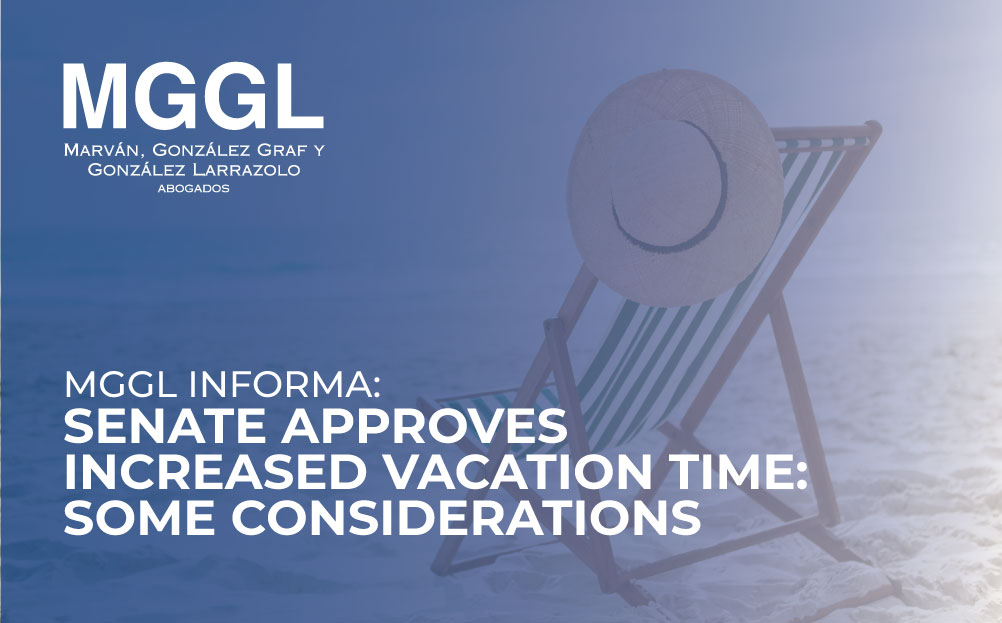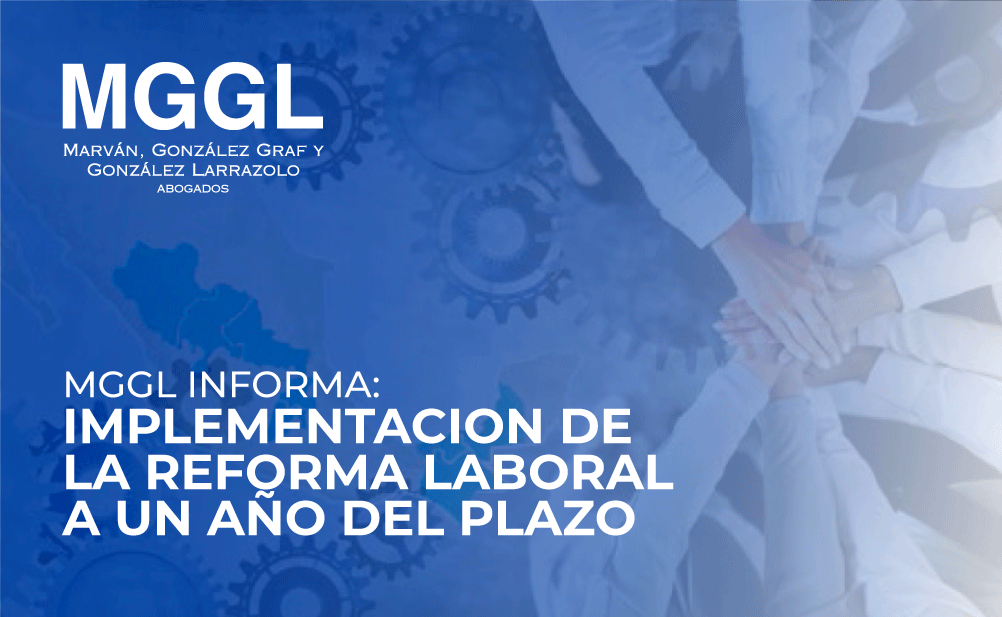On June 8, a reform to the General Law to Prevent, Punish and Eradicate Crimes in Connection With Human Trafficking and for the Protection and Assistance to Victims went into effect, as of which working hours that exceed, on a permanent basis, the limits established in the Federal Labor Law will be considered as labor exploitation and may be sanctioned with imprisonment and fines.
Continue readingOSCAR BOJORGE PROMOTED TO PARTNER
We are pleased to inform you that, as of January 1, 2024, Oscar Bojorge has become a partner at Marván González Graf y González Larrazolo, S.C.
Continue reading¿EXISTE PRÓRROGA PARA EL PROCESO DE LEGITIMACIÓN?
Como hemos informado anteriormente, está por concluir el plazo para la legitimación de Contratos Colectivos de Trabajo (CCT), a la fecha han sido legitimados únicamente 12,641 CCT. En torno al plazo otorgado para la legitimación, han circulado noticias que aseguran la extensión de este periodo.
Sin embargo, con fecha 6 de marzo de 2023, se publicó el acuerdo que aclara las condiciones en que operará el plazo para el registro y desahogo de los procedimientos de legitimación de CCT existentes. En dicho acuerdo, la Junta de Gobierno del Centro Federal de Conciliación y Registro Laboral aclaró que no existirá prórroga para la solicitud de legitimaciones de CCT, lo cual confirma que la fecha de vencimiento será el próximo 30 de abril de 2023. En consecuencia, todos los CCT que no hayan sido registrados para su legitimación en la plataforma del Centro de Conciliación y Registro Laboral se darán por terminados en la fecha mencionada.
Considerando lo anterior, la extensión señalada al 31 de julio de 2023 aplica al plazo para el desahogo de las consultas (votaciones) que se hubieran registrado antes del 1 de mayo de este año para efectos de legitimación de CCT, atendiendo a que durante la pandemia por covid-19 fueron suspendidas las mismas.
SENATE APPROVES INCREASED VACATION TIME FOR WORKERS IN MEXICO: SOME CONSIDERATIONS
On December 14, 2022, the Plenary Session of the Senate unanimously approved the draft bill to amend Articles 76 and 78 of the Federal Labor Law, presented by the Chamber of Deputies, regarding vacation time. The ruling is now passed to the Executive for its publication in the Official Gazette of the Federation. It will become effective on January 1st, 2023.
As mentioned in our previous newsletter, this reform is justified as our country was falling behind in terms of paid time off, and official vacation periods had not been revised since the enactment of the Federal Labor Law in 1970.
Aunque algunas iniciativas propuestas por senadores de diferentes grupos parlamentarios contemplaron esquemas de vacaciones con un mayor número de días, el dictamen aprobado se centró en el derecho a vacaciones pagadas. El texto reformado es el siguiente:
“…
Article 76. - Workers with more than one year of service shall enjoy an annual period of paid vacation, which in no case may be less than twelve working days, and which shall increase by two working days, until reaching twenty, for each subsequent year of service.
As from the sixth year, the vacation period shall increase by two days for every five years of service.
Article 78. -Of the total period corresponding in accordance with the provisions of Article 76 of this Law, the employee shall enjoy at least twelve days of continuous vacation. Said period, at the discretion of the worker, may be distributed in the manner and time so required.
…”
For clarity, the new vacation scheme would look as follows:
| Years worked | Vacation days |
|---|---|
| 1 | 12 |
| 2 | 14 |
| 3 | 16 |
| 4 | 18 |
| 5 | 20 |
| 6 a 10 | 22 |
| 11 a 15 | 24 |
| 16 a 20 | 26 |
In regard to the table above, although it is in the same terms as it was included in the various draft bills, from some points of view there could be a contradiction between the approved legal text and the way in which the new scheme was established. Considering that the reform states that the starting point is twelve days, increasing by two until reaching twenty and that from the sixth year onwards, two days will be increased every five years, this could lead to the interpretation that the period from the sixth to the ninth year is twenty days and that, until the tenth year, after the five-year period has elapsed, there would be a right to twenty-two days.
Another issue that generated controversy was whether the vacation period should be enjoyed continuously. The considerations of the approved bill point out that the reform seeks to guarantee and grant certainty to the employees, as well as paid time off according to their needs, but also recognizing that there are activities that cannot be substituted due to the degree of specialization of the work required. Therefore, although continuous vacation periods should be granted in general terms, the legal text allows the parties to agree on the time and form of distribution of vacation days, either continuously or partially.
Regarding the entry in force of the new provisions, vacation days already accrued and still pending to be taken will not be affected by this change. However, as of January 1st, 2023, when employees reach their anniversary, they will be entitled to a vacation period under the new scheme.
—
LEGISLATIVE PROPOSAL FOR LONGER VACATION PERIODS FOR MEXICAN WORKERS
On September 27, 2022, the senators that make up the Labor and Social Welfare Commission unanimously approved the Opinion to amend Articles 76 and 78 of the Federal Labor Law, presented by the United Commissions of Labor and Social Welfare and Legislative Studies, regarding vacations. Before its official approval, this opinion must be subject to review by the Chamber of Deputies.
The Opinion takes up the initiatives proposed by senators of different parliamentary groups. Although some initiatives contemplated vacation schemes with a greater number of days, and some even proposed a reduction of the working day, the approved Opinion only extends the right to paid vacations, to be as follows:
| YEARS WORKED | NUMBER OF DAYS OFF (PTO) |
| 1 | 12 |
| 2 | 14 |
| 3 | 16 |
| 4 | 18 |
| 5 | 20 |
| 6 a 10 | 22 |
| 11 a 15 | 24 |
| 16 a 20 | 26 |
The reform establishes that workers must continuously enjoy at least 12 days of vacation. This reform is justified on the basis of our country's lag in terms of holidays, since, when compared to other countries with a similar level of development to ours, Mexico is one of the countries with the lowest level of vacation periods around the world. For example, in Brazil and Panama, the legal standard is 30 days of vacation as of the first year, while the average in the region is almost 15 days.
The proposed Opinion points out that the World Health Organisation (WHO) estimates that in Mexico 75% of the workforce suffers from work-related stress, which puts us in a global first place, above the world's leading economies, such as China (73%) or the United States (59%). In this regard, it should be noted that specialists in the field have pointed out that short holiday periods have an impact on workers' stress levels, as well as being related to other ailments, such as chronic exhaustion (burnout).
Although everything seems to indicate that this reform will be approved in the short term, there is no certain date for it to be published in the Official Gazette, given the current legislative process. Employers' chambers have requested that the implementation of the reform be gradual so as not to harm small and medium-sized enterprises and to allow them to make the necessary projections and adjustments to comply with the new standard.
This change will have an operational and economic impact in companies, and will ultimately benefit them by increased employee satisfaction.
To read the full article, download the PDF here .
COMPLETION OF THE FINAL STAGE OF MEXICO’S LABOUR LAW REFORM
As a result of the May 2019 Labour Law Reform, the new model was implemented in each of the country's states in stages, facing delays mainly due to budgetary problems and the challenges of coordination between the state and federal levels. On 3 October 2022, however, the third and final stage of its implementation was completed. As of that date, the authorities that will attend new labour disputes in all federal entities of the Republic will be the Conciliation and Registration Centres and the Labour Courts.
With this implementation, the Conciliation and Arbitration Boards have ceased to see claims and any other requests related to new procedures, including out-of-court settlements, being in charge only of the processing and resolution of lawsuits that were previously filed before this authority.
As we have previously reported, the new procedure implies a mandatory pre-judicial conciliation before the Conciliation Centres as a condition for filing a lawsuit before the Labour Courts, except for those alleging discrimination or pregnancy, among others exceptions provided in the Law. The appearance of the employer is also compulsory, and the authority can impose fines in case of failure to appear, so we envisage that conciliation will play an important role in dispute resolution.
Contrary to the procedure followed before the Conciliation and Arbitration Boards, the stages of the new procedure are in writing, with the exception of the preliminary and trial hearings.
The procedure before the Labour Courts implies new challenges for the defence of the cases, as the new regulations impact procedural terms and the burden of proof for the parties. This will also be reflected in new forms of administration of the employment relationship, from its inception to its termination.
Notwithstanding the challenges that a transformation of this scale implies, this change has generated the expectation of having greater legal certainty and shorter times in the resolution of conflicts, which, in the experience of the first two stages, have been resolved within the procedural terms established by law. In the states where the new procedure was previously initiated, disputes have been resolved on average within a timespan of 6.1 months.
With this third stage, Mexico is closer to fulfilling its commitments under T-MEC, the free trade agreement between Canada, Mexico, and the United States. What remains pending in this regard is the deadline for the legitimisation of collective bargaining agreements, which, like the implementation of the new labour justice model, has faced operational challenges.
To read the full article, download the PDF here .
THE IMPLEMENTATION OF MEXICO’S LABOR LAW REFORM ONE YEAR BEFORE TAKING FULL EFFECT
BUSCAMOS ESTUDIANTE DE ÚLTIMO AÑO O RECIÉN EGRESADO
Aplica here.
SOBRE LA CONCILIACIÓN EN MATERIA LABORAL
La palabra conciliación ha estado por muchos años en la denominación de la autoridad encargada de dirimir las controversias entre el capital y el trabajo y, de acuerdo con el concepto propuesto por la Organización Internacional del Trabajo, la conciliación es una práctica consistente en utilizar “un mecanismo por el cual se asiste a las partes en conflicto, mediante la intervención de un tercero neutral, a fin de que alcancen una solución”. (Disposiciones sustantivas de la legislación del trabajo: Resolución de conflictos colectivos de trabajo. Guía sobre legislación del trabajo, OIT).
La conciliación se vislumbraba formalmente como una etapa del procedimiento y se ha asemejado más a la mediación, implicando que la autoridad interviniera con el objeto de que las partes en conflicto dialoguen. Por el contrario, con la reforma laboral el conciliador debe participar activamente en la solución del conflicto, estableciendo estrategias de negociación encaminadas a encontrar una solución.
En 2012 se intentó involucrar más a la conciliación, adicionando la figura del funcionario conciliador e imponiendo a las Juntas la obligación de promover que las partes resuelvan los conflictos mediante la conciliación.
Con la reforma a la Constitución de 2017 y a la Ley Federal del Trabajo de 2019, se dio un cambio en el paradigma de la función conciliatoria en el nuevo sistema de justicia laboral, se determinó la existencia de la conciliación prejudicial obligatoria, con diversas excepciones como en casos de discriminación en el empleo y ocupación por embarazo, así como por razones de sexo, orientación sexual, raza, religión, origen étnico, condición social o acoso u hostigamiento sexual.
La conciliación prejudicial impone la obligación a trabajadores y empleadores de someterse a una audiencia conciliadora antes de comenzar un juicio, imponiendo multas para el caso de inasistencia por parte del patrón.
La función conciliatoria está a cargo de Centros de Conciliación locales y a nivel federal a cargo del Centro Federal de Conciliación y Registro Laboral que es un organismo descentralizado, ubicando a la conciliación prejudicial en la materialización del derecho fundamental de acceso a la justicia en sede administrativa.
Con lo anterior, el acceso a la justicia no sólo está bajo un aspecto jurisdiccional, sino también, a través de un procedimiento alterno para la solución de las controversias laborales, con el objetivo de obtener mayores acuerdos entre trabajadores y empleadores previo a tramitar un juicio.
Puedes leer el volumen completo de la revista here.
Por José Genaro Pérez.

PAULINA MENDIETTA SELECCIONADA COMO “TOMORROW’S LEADER POR INTERNATIONAL EMPLOYMENT LAWYER”
Marván González Graf y González Larrazolo is proud to share with you the next achievement of our associate Paulina Mendietta, who was selected as a future market leader around the world, being the only lawyer in Mexico to be nominated.
International Employment Lawyer is an independent information service dedicated to delivering timely reporting, data, and analysis of the latest trends and developments in the management of multinational organisations’ workforces.
"Having set out to showcase the future leaders of employment and labour law around the globe, IEL is proud to unveil our inaugural Tomorrow’s Leaders 2022 thought-leadership survey. The individuals below have been identified based on their involvement in high-profile or innovative disputes, projects, or deals during their first decade of practice, and their expert opinions on the future challenges set to rock the world of work.
Our inaugural class of 29 employment and labour law specialists – 14 men and 15 women – hail from 19 countries and represent the full legal ecosystem."
To view the interview, please access the page below and create an account. The interview is only available in English.
International Employment Lawyer










